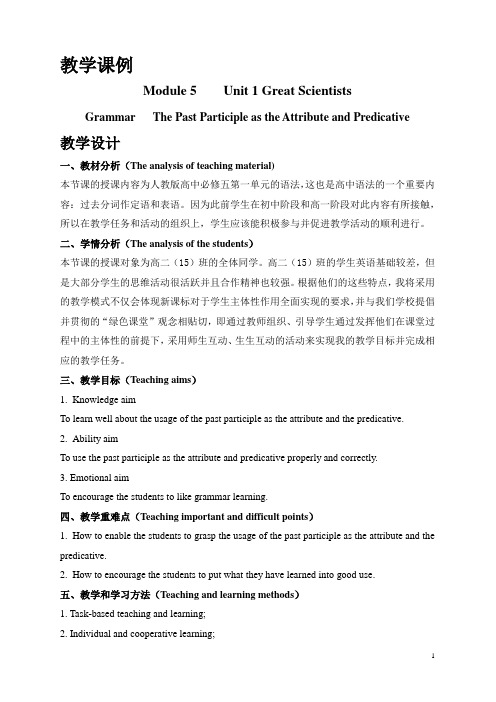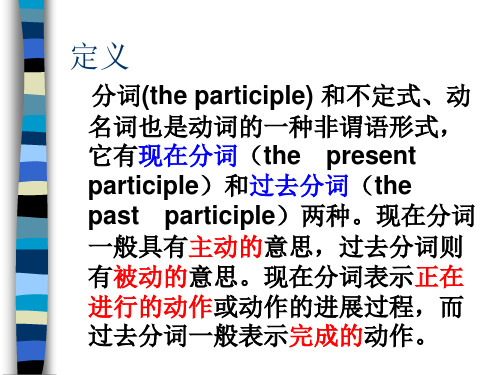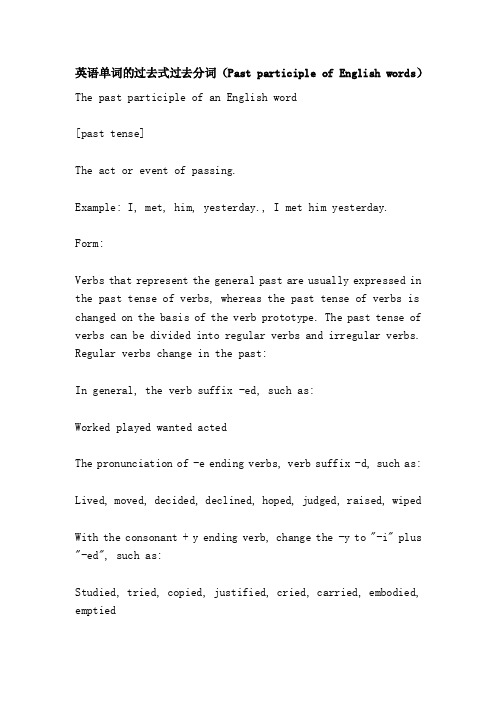the past participle
英语 教学课例 GrammarThe Past Participle as the Attribute and Predicative

教学课例Module 5 Unit 1 Great ScientistsGrammar The Past Participle as the Attribute and Predicative教学设计一、教材分析(The analysis of teaching material)本节课的授课内容为人教版高中必修五第一单元的语法,这也是高中语法的一个重要内容:过去分词作定语和表语。
因为此前学生在初中阶段和高一阶段对此内容有所接触,所以在教学任务和活动的组织上,学生应该能积极参与并促进教学活动的顺利进行。
二、学情分析(The analysis of the students)本节课的授课对象为高二(15)班的全体同学。
高二(15)班的学生英语基础较差,但是大部分学生的思维活动很活跃并且合作精神也较强。
根据他们的这些特点,我将采用的教学模式不仅会体现新课标对于学生主体性作用全面实现的要求,并与我们学校提倡并贯彻的“绿色课堂”观念相贴切,即通过教师组织、引导学生通过发挥他们在课堂过程中的主体性的前提下,采用师生互动、生生互动的活动来实现我的教学目标并完成相应的教学任务。
三、教学目标(Teaching aims)1. Knowledge aimTo learn well about the usage of the past participle as the attribute and the predicative.2. Ability aimTo use the past participle as the attribute and predicative properly and correctly.3. Emotional aimTo encourage the students to like grammar learning.四、教学重难点(Teaching important and difficult points)1. How to enable the students to grasp the usage of the past participle as the attribute and the predicative.2. How to encourage the students to put what they have learned into good use.五、教学和学习方法(Teaching and learning methods)1. Task-based teaching and learning;2. Individual and cooperative learning;3. Brainstorming;六、教学辅助(Teaching aids)1.The multimedia;2.The learning paper;3.Other normal teaching tools七、教学过程(Teaching procedures)八、板书设计(Blackboard Design)课堂实录Step 1 GreetingStep 2 RevisionT: can you tell me what’s the grammar we learned in last unit?S: The usage of present participles.T: Good! We have learned the usage of present participles in last unit, so firstly, I’d like tolead you to have a revision about it . OK?S: OK!T: Now look at the screen, there are six sentences. Try to tell me what the underlined present participles are used for in these sentences? Clear?1.Walking in the street, he saw an old friend.2.Reading aloud is a good way in learning English.3.I tried to avoid making the same mistakes.4.I saw a boy getting on the bus.5.There is a swimming pool.6.The film we saw last night was very moving.S: Yes! They are used for adverbial/ subject/ object/ object complement/ attribute/ predicative/.(本部分用来复习上单元学习的现在分词的用法,从而引出非谓语的另一种形式----过去分词的用法)Step 3 warming-upT: Please take out your textbook and turn your book to page2 . Try to find out the sentences in the passage of where the past participles are used, and tell me what these past participles are used for? I will give you two minutes.( 2 mins later...)T: Have you finished it? What are these participles in the passage used for?S: Yes. They are used for the attribute and the predicative.(本部分通过从课文中找出含有过去分词作定语和表语的句子让学生对本节课的语法有着更直观的认识,从而有利于本节语法课的讲解。
participle(分词)

Correction:
4.Act as the adverbial:( 状语)
A.表示时间,相当于时间状语从句 (1) Wandering through the street, I caught sight of my teacher. (2)( When/While) reading the book, I noticed a few spelling mistakes. (3) Taken around the city, we were impressed by its new look. (4)(When) asked to answer the question,she was very nervous. B.表示原因,相当于原因状语从句 (1)Thinking he might be at home, I called him.
a developed country
a tiring speech a tired heart a disappointing boy a disappointed boy
I.Function:功能
1.Act as the predicative:(表语)
1) The result was surprising./They were surprised at
the boiled water the water that has boiled
the changing city the changed city
the city that is changing the city that has changed
a developing country
a country that is developing a country that has developed a speech that is tiring a heart that is tired a boy who is disappointing a boy who is disappointed
英语单词的过去式过去分词(PastparticipleofEnglishwords)

英语单词的过去式过去分词(Past participle of English words)The past participle of an English word[past tense]The act or event of passing.Example: I, met, him, yesterday., I met him yesterday.Form:Verbs that represent the general past are usually expressed in the past tense of verbs, whereas the past tense of verbs is changed on the basis of the verb prototype. The past tense of verbs can be divided into regular verbs and irregular verbs. Regular verbs change in the past:In general, the verb suffix -ed, such as:Worked played wanted actedThe pronunciation of -e ending verbs, verb suffix -d, such as:Lived, moved, decided, declined, hoped, judged, raised, wipedWith the consonant + y ending verb, change the -y to "-i" plus "-ed", such as:Studied, tried, copied, justified, cried, carried, embodied, emptiedEnd with a consonant of the stressed syllable verbs, double consonant consonant, plus -ed, such as:Stopped, begged, fretted, dragged, dropped, planned, dotted, drippedNote: irregular verbs do not have a strong change of past tense. They should be more memory.Go - went make - made get - got buy - bought come - came fly-flew is/am-was are-were see-saw bring-broughtUsage:(1) expressing action or past a certain time or a period of time that occur, usually with past said action time adverbial words, phrases or clauses, such as yesterday, the day, before last, last week, two days ago, you can clear context without time. I, worked, in, that, factory, year., last, I worked in that factory last year. I went, to,, the, Tian, Long, Mountain, yesterday.. Yesterday we went to dragon hill.(2)General past tense: the act or state of being occurring at a certain time in the past. The predicate verb should use the general past tense.Time mark: yesterday (yesterday), last week (last week), last month (last month), last year (last year), two months ago (two months ago), the day before yesterday (the day before), in 1990(in 1990), in those days (in those days) such that the last time.Such as: I, was, born, in, 1990. (I was born in 1990).When, did, you, go, to, the, park? (when did you go to the park?).I, went, to, the, park, last, week. (I went to the park last week)In the above sentence, the first sentence belongs to the general past tense of the be verb; the second and third sentences belong to the general past tense of the notional verb.The general past tense of a 1.Be verbIn a sentence without a notional verb, use the be verb; the past tense of AM is is was; the past tense of are is were.Composition: affirmative sentence: subject +was (were) + objectI, was, late, yesterday. (I was late yesterday)Negation: subject +was (were) +not+ objectSuch as: We, weren't, late, yesterday. (we were not late yesterday)Interrogative sentence: Was (Were) + subject + objectSuch as: Were, you, ill, yesterday? (were you sick yesterday?)Sure answer: Yes, I was. (yes, I'm sick.). )Negative sentence: No, I wasn't. (no, I'm not ill. )Special question: special interrogative word +was (were) + subject + objectWhen: When, were, you, born? When were you born?Pronunciation:The rules of verb suffix plus -ed has three pronunciations:1. read "[t]" after voiceless consonants. Such as: asked, helped, watched, stopped2. read [d] after voiced consonants and vowels. Such as: enjoyed, studied, moved, called3. read after t / D as [id].Such as: wanted, neededThe past tense of irregular verbs is generally summed up in the following six ways of memory:1. in the end of the word t, the past is the same as the original. Such as: put - put, let - let, cut - cut, beat - beat2. change the word "d" to "t" with the word "d" at the end. Such as: build - built, lend - lent, send - sent, spend - spent3. n at the end of the word, add t after the word. Such as: Mean - meant, burn - burnt, learn - learnt4. turn the ow / AW into EW at the end of the ow / aw. Such as: Blow - blew, draw - drew, know - knew, grow - grew5. with double letter words, will double to single write, in the ending t. Such as: keep - kept, sleep - slept, feel - felt, smell - Smelt6. contains the vowel letter "O / I", which turns O / I intoa. Such as: Sing - sang, give - gave, sit - sat, drink - drank[past participle]The past participle of a regular verb consists of the prototype of a verb plus ed, and the past participle of an irregular verb is represented by an irregular verb table.The past participle belongs to a class verb1. past participle verb predicate and the subject of the sentence is passive, said the subject, not only passive, also said it has completed.The, cup, is, broken., the teacup is broken2. the past participle of the intransitive verb predicate, andthe subject of the sentence is active, said the subject, only that the completion of an action.He is retired., he's retired3. some of the past participles as predicative, a predicate is very close to the passive structure.The past participle forms the rules1 regular verbs: the regular rules of regular verbs are the same as those of regular verbs. Four point change rule:(1), general verb, "ed added directly in the".Work---worked---worked, visit---visited---visited(2), ending in "e" verb plus suffix "d only in the".Live---lived---lived,(3) the verb that ends with "consonant + Y" turns "Y" into "I", plus "ed"".Study---studied---studied, cry---cried---cried,Play---played---played, stay---stayed---stayed(4) repeat the ending of a closed syllable, with only one consonant at the end. First write the consonant, and then add "ed"".Stop---stopped---stopped, drop---dropped--dropped2, irregular verbs, see irregular rulesFirst, when the past participle.The City, is, surrounded,, on, three, sides, by, mountains., the city is surrounded on the other by mountains[note] the difference between the past participles as predicative and passive voice: the past participle used as predicative, mainly expresses the subject of the state, and the passive voice said.(1) The, cup, was, broken, by, my, little, sister, yesterday., tea cup, my sister broke it yesterday(2) The library is now closed. library was closed. (the past participle used as predicative)[note] the past participle passive or complete -ing form or active. Some verbs such as interest, bore, worry, surprise, frighten etc. are usually modified by the past participle form, in the form of -ing to modify.(3) The, book, is, interesting, and, I'm, interested, in, it., this book is very interesting, I'm interested in itTwo, when the past participle as an attributePast participles used as attributive adjectives equivalent, it is the logical subject of modified nouns. Transitive verb past participle as attribute, both passive and complete; the past participle of the intransitive verb as attribute, watch.1. the past participle is used as an attribute, and if it isa single one, it is always placed before its modified NOUN我们必须使我们的思想适应变化了的情况。
Thepastparticiple-PPT文档资料-文档资料

newly-elected president is having
a hard time.
A. settled
B.settling
C. to settle D. being settled
4.With trees,flowers and grass_____ everywhere, my native town had taken a new look. A. planting B. planted C. to plant D. to be planted
Eg.1. Soon you see many problems settled this way.
2.The manager discussed the plan that they would like to see carried out the next day.
3.I was sleeping when I heard my name called.
3).keep / leave +o +o.c doing(主动关系) done(被动关系)
4).find +o +o.c
doing done
Sb be found
doing done
1. Please keep us informed of the latest news.
2. Please leave the door unlocked. The door was found broken.
Her bag was found stolen when she woke up.
Sb. found her bag stolen when….
3. When he woke up,he found himself lying in the hospital.
past participle的用法

Past Participle的用法1. Past Participle的定义和形式Past Participle(过去分词)是英语中的一种非谓语形式,通常用来形容或修饰名词或代词。
在过去式动词的基础上加上-ed或不规则形式构成。
例如,动词”eat”的过去分词形式是”eaten”,动词”go”的过去分词形式是”gone”。
2. 作为形容词的用法Past Participle可以作为形容词用来修饰名词或代词,起到描述或说明的作用。
常见的例子有: - The broken vase needs to be repaired.(需要修理的破花瓶)- The lost dog was found by its owner.(迷路的狗被它的主人找到了)在这些句子中,“broken”和”lost”都是过去分词形式作为形容词修饰了名词。
3. 作为完成时的用法Past Participle还常常用来形成完成时态,表示过去发生的动作或状态与现在的关系。
完成时态由助动词have/has/had加上动词的过去分词构成。
例如: - I have finished my homework.(我已经完成了作业) - They had already left when I arrived.(当我到达时,他们已经离开了)完成时态用来强调过去的行为或状态对现在的影响或结果。
通过使用已经完成的动作,我们可以清楚地表示出这种关系。
4. 作为被动语态的用法Past Participle还可以用来构成被动语态。
被动语态是指将句子的主语变成动作的接受者,并且使用助动词”be”加上动词的过去分词形式。
例如: - The cake was baked by my mother.(蛋糕是我妈妈烤的) - The book has been written by a famous author.(这本书是由一位著名作家写的)被动语态使得我们可以强调动作的接受者,而不是动作的执行者。
八年级英语上学期the-past-participle-tense外研英语

新人教版必修五英语The past participle(过去分词)
2). Laughed at by many people, he continued his study. =Although he was laughed at by many people, he continued his study. 3).Explained a hundred times, the problem still can't be understood. =Even if the problem is explained a hundred times, the problem still can‘t be understood. 即使解释一百遍,这个
Unit 3 Life in the future Grammar
The past participle(过去分词) is used as adverbial.(状语)
教学目标
1. Let students learn how to use of the past participle as the adverbial. 2.Get students to become interested in the grammar learning.
3.过去分词作条件状语 相当于条件状语从句。可转换为if , once, unless等从属连词引导的状语从句。
1). Compared with you, we still have a long way to go. = If we are compared with you, we still have a long way to go. 2) Given another chance, he will do better. =If he is given another chance, he will do better.
The past participle
The past participle(过去分词) is used as adverbial.(状语)一过去分词作状语,一是表被动的动作,二是表动作已经完成。
通常作如下几种状语:2)much better.)二、过去分词做状语应该注意的几个问题:(1)有些过去分词因来源于系表结构,作状语时不表被动而表主动。
这样的过去分词及短语常见的有:lost (专注于);tied (厌烦);exhausted(筋疲力尽)worried(担心);astonished(惊讶);moved (感动);surprised; excited, etc.Lost / in deep thought, he didn’t hear the sound.Worried about the journey, I was unsettled for the first few days.(2)状语从句改成过去分词作状语时有时还可保留连词,构成“连词+过去分词”结构作状语。
这些连词有when, once, if, unless, though, as if, although, even if, even though, as等When given a medical examination, you should keep calm.当你做体格检查时要保持镇定。
(3)过去分词作状语的位置。
过去分词可放在主句前作句首状语,后面有逗号与主句隔开;也可放在主句后面,前面有逗号与主句隔开。
He stood there silently, moved to tears. = Moved to tears, he stood there silently.他静静地站在那里,被感动得热泪盈眶。
(4)如果过去分词作状语时,前面再加逻辑主语,主句的主语就不再是分词的逻辑主语,这种带逻辑主语的过去分词结构实际上属于独立主格结构。
(1) The signal given, the bus started. 信号一发出,汽车就开动了。
过去分词与现在分词
过去分词与现在分词用法比较英语中的分词分两种:现在分词(the present participle)和过去分词(the past participle)。
虽然它们在句子中都可作名词修饰语、接系动词补足语、宾语补足语等,但是它们形式不同,而且语义也有差别。
现在从四方面举例说明。
⒈现在分词表示动作是主动的和正在实行的(例①-③);过去分词的动作是被动的和完成的(例④-⑥):① The boiling water is hot.② A sleep ing baby is good to look at.③ She has a smiling face.④ You can use the boiled water to make tea.⑤ Where is my lost key?⑥ A broken mirror cannot be repaired.有时,因为两个动词“异词同义”,其分词也跟着不同,如:⑦a. Have you seen the man wearing a T-shirt?b. Who is the man dressed in a blue shirt?⑧a. His new book consisting of useful data has been well received.b. Do you like the book made up of untrue stories?⒉在语义上,现在分词和过去分词反映的心理状态不同。
前者有“令人……”的含义(见例⑨);过去分词则有“感到……”的意思(见例⑩):⑨ The soccer ma tch last night was thrilling.(令人紧张)⑩ The soccer fans were delighted.(感到快乐)其他例子有:● amazing: amazed;● annoying: annoyed;● boring: bored;● confusing: confused;● surprising: surprised;● terrifying: terrified试比较11a和b以及12a和b:11a. This is the most confusing system I have ever seen.11b. The children will get confused if asked to learn too much at a time.12a. David came with some surprising news.12b. All were surprised at Sam's sudden resignation.⒊在作宾语补足语时,假如宾语是相关分词逻辑上的主语,就用现在分词,如:13. The teacher found a student dozing off.14. Don't keep the visitor waiting.假如宾语和相关分词有“动词+宾语”关系,那么这个分词就要是过去分词了,如:15. Where did you get your book printed?16. You should have your office whitewashed.在13里,正在打瞌睡的是宾语“a student”; 在14里,宾语是“the visitor”。
The past participle of the verbs
Verb write drive speak go see wear [we ] choose [t u:z]
Past Tense wrote drove spoke went saw wore [w :] chose [t z]
P.P. written ['r tn] driven [dr vn] spoken ['sp k gone [g n] seen [si:n] worn [w :n] chosen ['t zn]
swum [sw m]
Verb Past Tense P.P. 5.ow-----------ew-------------own blow know throw [ r ] blew knew threw [ ru:] blown [bl known [n thrown [ r n] n] n]
k] thought [ :n] learnt [l
mean [mi:n] meant [ment] meant
Verb
Past Tense
P.P. run come
3.动词原形和过去分词相同 ran run come came
Verb Past Tense P.P. 4. i---------------a--------------u begun [b 'g n] began begin sing drink swim sang drank swam sung [s drunk [dr ] k]
Somnus Lee
Verb
Past Tense
Past Participle p.p.
1.变化相同: 变化相同: hit cut put hurt read [ri:d] hit cut put hurt read [red] hit cut put hurt read [ri:d]
- 1、下载文档前请自行甄别文档内容的完整性,平台不提供额外的编辑、内容补充、找答案等附加服务。
- 2、"仅部分预览"的文档,不可在线预览部分如存在完整性等问题,可反馈申请退款(可完整预览的文档不适用该条件!)。
- 3、如文档侵犯您的权益,请联系客服反馈,我们会尽快为您处理(人工客服工作时间:9:00-18:30)。
( )1. _______ more attention, the tree could have grown better. (90’全国) A. Given B. To give C. Giving D. Having given. ( )2. The computer center, ________ last year, is very popular among the students in this school(93’全国) A. open B. opening C. having opened D. opened
( )6. _______ such heavy pollution already, it may now be too late to clean up the river. (01’全国夏) A. Having suffered B. Suffering C. To suffer D. Suffered ( )7. The researcher is so designed that once ________ nothing can be done to change it.(02’全国) A. begins B. having begun C. beginning D. begun
( )14. Mr. Smith, _______ of the ________ speech, started to read a novel. (03’北京春) A. tired; boring B. tiring; bored C. tired; bored D. tiring; boring ( )15. ________ time, he’ll make a firstclass tennis player. (03’北京) A. Having given B. To give C. Giving D. Given
( )3. The first textbooks ________ for teaching English as a foreign language came out in the 16th century.(94’全国) A. having written B. to be written C. being written D. written ( )4. ________ is thought, he almost ran into the car in front of him.(96’全国) A. Losing B. Having lost C. Lost D. To lose
( )10. Prices of daily goods ________ through a computer can be lower than store prices.(02’京皖春) A. are bought B. bought C. been bought D. buying ( )11. Don’t use words, expressions, or phrases ________ only to people with specific knowledge. (02’上海) A. being known B. having been known C. to be known D. k6-10 ADCAB 11-15 DAAAD)
( )12. Unless ________ to speak, you should remain silent at the conference.(03’上海春) A. invited B. inviting C. being invited D. having invited ( )13. Friendship is like money: easier made than ______. (03’北京) A. kept B. to be kept C. keeping D. having kept
( )8. ________ in 1636, Harvard is one of the most famous universities in the United States.(00’上海) A. Being founded B. It was founded C. Founded D. Founding ( )9. When ________, the museum will be open to the public next year. (02’上海春) A. completed B. completing C. being completed D. to be completed
